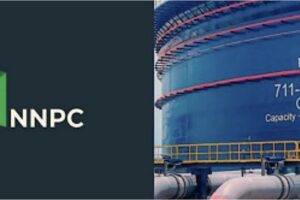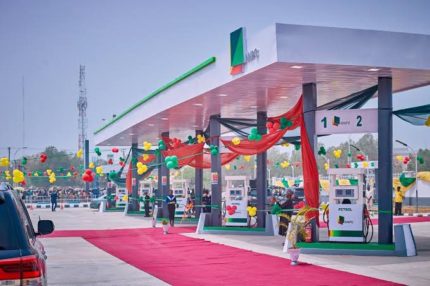A significant disagreement emerged between the Nigerian National Petroleum Company Limited (NNPCL) and Dangote Refinery over the pricing of petrol following the refinery’s first supply to the national petroleum company. The disagreement centers on the price per liter of Premium Motor Spirit (PMS), which was supplied at N898, sparking a debate over the basis for this pricing.
While NNPCL confirmed receiving the product at N898 per liter, Dangote Refinery argued that this price reflects the cost of crude oil imported for refining in dollars, not an agreed-upon local price. Anthony Chiejina, Group Chief Branding and Communications Officer at Dangote, dismissed NNPCL’s pricing claims as “misleading and mischievous,” emphasizing that a formal pricing mechanism for crude supplied to local refineries would only be announced on October 1, 2024. The refinery clarified that until then, prices will reflect the dollar-based procurement of crude oil for refining.
Petrol Supply Challenges and Domestic Shortfall
Despite the first lifting of petrol by NNPCL from Dangote Refinery, concerns about fuel supply shortages in Nigeria persist. Dangote Refinery’s initial delivery fell 38.8% short of the expected volume, delivering only 16.8 million liters of PMS out of an anticipated 25 million liters. This shortfall has raised alarms about the potential continuation of fuel scarcity in the country, given that Nigeria’s domestic petrol consumption currently stands at 44.3 million liters per day.
This shortage was formally communicated to NNPCL, with Dangote Refinery stating that only 12,200 metric tons of PMS could be released from its tank for this first batch. In response, NNPCL has mobilized over 300 trucks and a vessel to transport the fuel, but experts fear that the supply will be inadequate to meet the country’s fuel demand, prolonging the lingering fuel scarcity.
Depot Owners Await Pricing Clarity
The Depot and Petroleum Products Marketers Association of Nigeria (DAPPMAN) has expressed readiness to lift petrol from Dangote Refinery but is waiting for clarity on pricing mechanisms. Executive Secretary of DAPPMAN, Olufemi Adewole, stated that while depot owners have been lifting diesel and aviation fuel, they are cautious about lifting PMS without clear guidelines on its pricing.
Adewole emphasized that once pricing is clarified, depots will take the necessary steps to distribute petrol efficiently across Nigeria, a crucial step towards addressing the country’s energy needs. The “naira for crude” arrangement, where crude oil is sold to local refineries and products purchased in naira, plays a central role in the new fuel distribution strategy.
Dangote Refinery Poised to Meet Domestic and Export Demand
Dangote Refinery, touted as a game changer for Nigeria’s petroleum supply, is set to fulfill both domestic and export demands for refined petrol. Vice President of Dangote Industries, Devakumar Edwin, highlighted that the refinery, capable of refining 650,000 barrels of crude oil daily, will soon not only meet Nigeria’s entire petrol needs but also produce a surplus for export.
Edwin expressed pride in the fact that a Nigerian-owned company was leading this monumental project, which promises to resolve Nigeria’s half-century-old fuel supply issues. The refinery’s capacity to produce over 54 million liters of petrol daily represents a significant milestone, and its ability to produce other refined products further underscores its strategic importance in stabilizing Nigeria’s fuel supply and boosting the economy through exports.
LASG Implements E-Call Up System on Lekki-Epe Port Corridor
In a move to prevent congestion caused by articulated trucks and enhance logistics operations, the Lagos State Government has announced the commencement of its e-call up system on the Lekki-Epe Free Trade Zone corridor. Starting next week, the system aims to manage the flow of trucks within the area, especially between Eleko Junction and the Lekki Free Trade Zone, which includes critical facilities like the Lekki Deep Sea Port and the Dangote Refinery.
According to Mrs. Bolanle Ogunlolu, Deputy Director of Public Affairs at the Lagos State Ministry of Transport, the e-call up system had been initially delayed to allow stakeholders time to fully comply with the new regulations. Commissioner for Transport, Seun Osiyemi, emphasized that this technology-driven solution would bring order to truck movement within one of Lagos’ busiest economic zones. He highlighted that the synchronization of truck movements via the e-call up system would significantly reduce traffic congestion along the Lekki-Epe axis.
Benefits of the E-Call Up System for Efficient Truck Movement
The e-call up system, described by Osiyemi as an advanced digital platform, will regulate the entry and exit of trucks, ensuring they adhere to scheduled movements. This will prevent the indiscriminate parking of trucks, a common cause of traffic chaos in the area. The platform aims to improve efficiency and safety for industries operating within the Lekki-Epe corridor by reducing bottlenecks and ensuring a steady flow of goods.
In addition to this, the Lagos State Government is collaborating with the federal government to expand road networks and develop an intermodal transport system, which will further streamline vehicular movement in the area. Special Adviser to the Governor on Transportation, Sola Giwa, noted that a temporary arrangement would also be enforced, which involves the removal of illegal tankers from key zones. A joint task force, involving local authorities, security agencies, and other stakeholders, will oversee the evacuation process, ensuring smoother traffic flow along the corridor.
Table of Contents
Discover more from OGM News NG
Subscribe to get the latest posts sent to your email.














